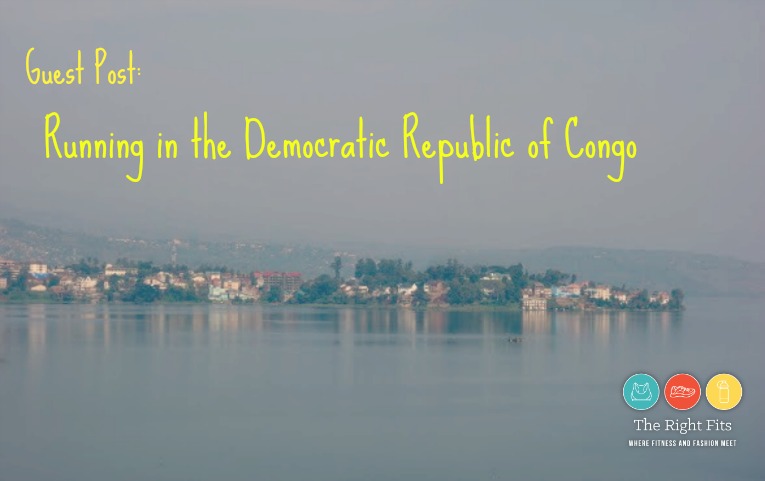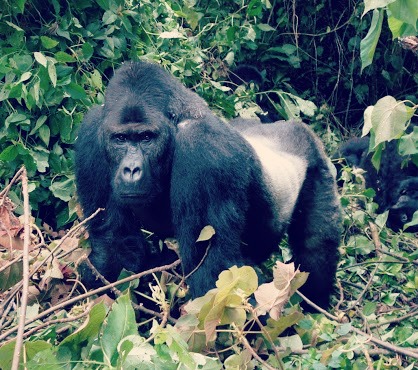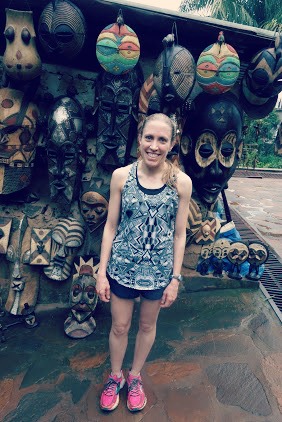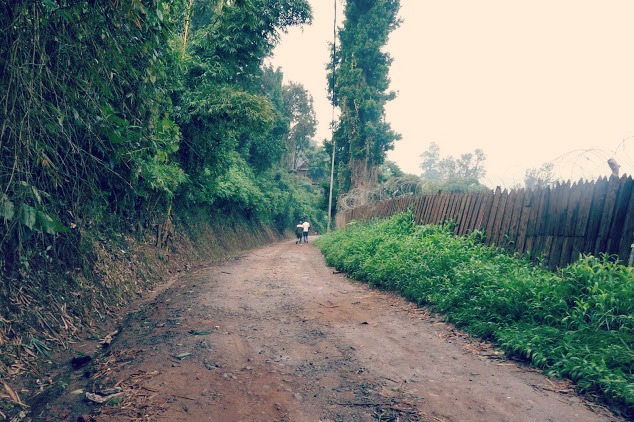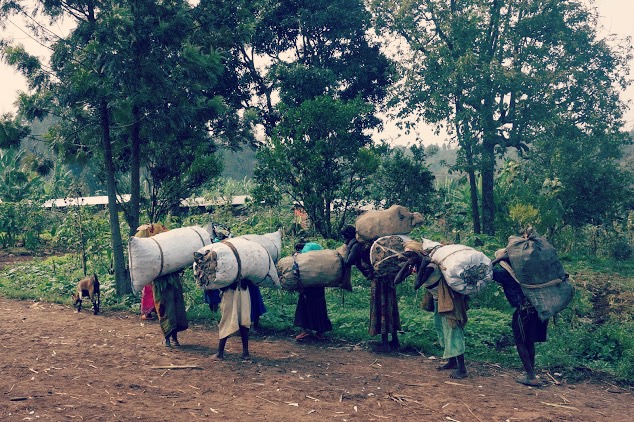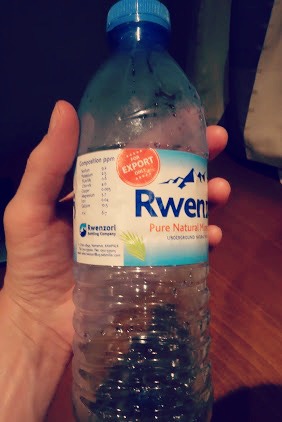I have an awesome guest post today by my friend Betsy from the Calhoun Beach Running Club (who also did this guest post.) She recently traveled to the Democratic Republic of Congo (DRC) and is here to share her experience running there.
Here is her story!
It’s amazing the kinds of connections runners forge over the miles of marathon training, and the places those connections will take you–from Minnesota to Rwanda and Democratic Republic of Congo, for example. I spent a week there in late January, traveling with a small group from the American Refugee Committee. ARC is headquartered here in Minneapolis, with most of its employees scattered around the dozen or so countries where it works to provide assistance in crisis situations (shelter, nutrition, health care) and to help victims of conflict rebuild lives with dignity (trauma counseling, legal aid, microcredit). It’s a fantastic organization. I’m lucky to be an attorney at a law firm that supports ARC’s work, and my running friend Mark is even luckier to be its CFO.
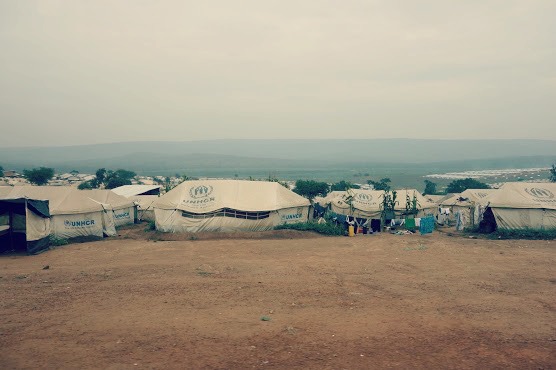
Our itinerary was packed: a day at the Mahama Refugee Camp for Burundian refugees in southeastern Rwanda; travel to the other side of the country for a land border crossing into DRC; site visits in a number of rural Congolese villages; a morning at a national park among endangered eastern lowland gorillas; and, naturally, a couple hill workouts.
As it turned out, the Rwandan portion of the trip was so busy that we didn’t get any running in there at all. The days were fully scheduled, and in the evenings there were dinners with ARC employees (some with powerful personal stories), representatives from other organizations (including the Rwandan director of Indego Africa), and UNHCR officials. One night we stayed out much too late listening to live music played by a friend of a friend who works with Musicians Without Borders at the refugee camp we visited. Part of being a runner is finding the right balance, and these other experiences outweighed logging our usual number of running miles.
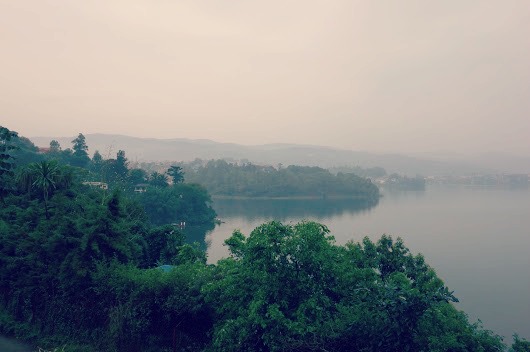 Our first run of the trip was on our first full day in DRC, near our hotel in Bukavu, on the southern tip of Lake Kivu. From a distance, Bukavu looks like any lovely picture postcard: colorful rooftops terraced into the hillsides, graceful peninsulas reaching into the glassy lake, distant volcanic mountains fading in and out of the tropical haze. Up closer you can see the ravages of conflict: deserted and collapsing buildings, UN peacekeepers and Doctors Without Borders trucks hurtling down the pocked dirt roads.
Our first run of the trip was on our first full day in DRC, near our hotel in Bukavu, on the southern tip of Lake Kivu. From a distance, Bukavu looks like any lovely picture postcard: colorful rooftops terraced into the hillsides, graceful peninsulas reaching into the glassy lake, distant volcanic mountains fading in and out of the tropical haze. Up closer you can see the ravages of conflict: deserted and collapsing buildings, UN peacekeepers and Doctors Without Borders trucks hurtling down the pocked dirt roads.
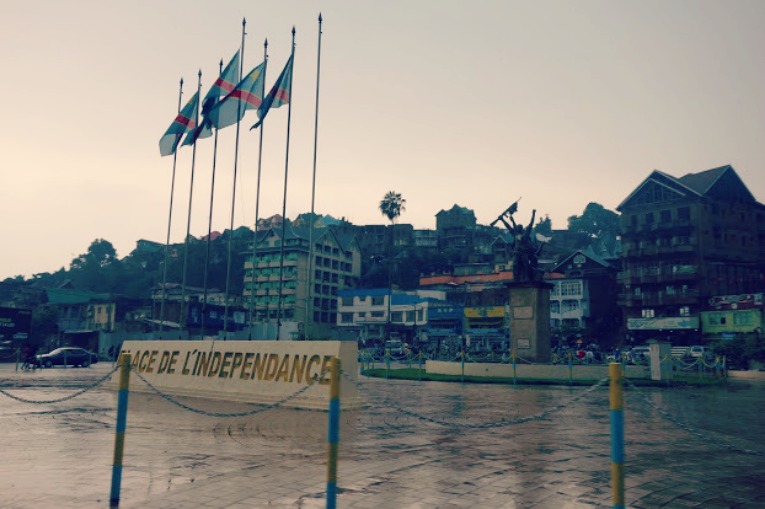 Bukavu is a city of 2 million with no traffic lights. The right of way on the streets goes to the largest vehicle. Motorcycles, many serving as taxis, weave in and out among the cars. Vehicles often face each other head-on as one steers to the other side of the street to avoid an especially large pothole. Pedestrians are expected to stay on alert and get out of the way—and sidewalks are few and far between.
Bukavu is a city of 2 million with no traffic lights. The right of way on the streets goes to the largest vehicle. Motorcycles, many serving as taxis, weave in and out among the cars. Vehicles often face each other head-on as one steers to the other side of the street to avoid an especially large pothole. Pedestrians are expected to stay on alert and get out of the way—and sidewalks are few and far between.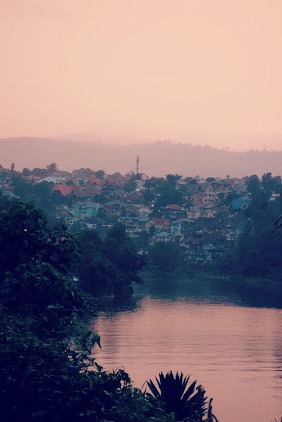
So we stayed close to the hotel for our runs, on the relatively quiet streets on one of the peninsulas. This was Mark’s sixth trip to Bukavu in the last few years, and I trusted his judgment for choosing a route. Sunrise this close to the equator is always around 6 am. We started running a little after that, about 6:20.
 Traffic at that hour was light, and Mark used hand signals liberally to communicate with drivers (and me) as we picked our way around the potholes. We saw kids in blue and white uniforms walking to school, sometimes accompanied by parents making their way to work. We passed a car wash getting set up for the day, a couple men sitting under an umbrella hawking mobile phone services, pigs and chickens wandering into the street from someone’s yard, and the general stirrings of a city waking up. Most people greeted us with a friendly jambo sana (Swahili) or bonjour (French). Many gave us odd looks. A few yelled out “Courage! Courage!,” which I mis-heard as “Rush! Rush!” Either way, it was clear they were cheering us on.
Traffic at that hour was light, and Mark used hand signals liberally to communicate with drivers (and me) as we picked our way around the potholes. We saw kids in blue and white uniforms walking to school, sometimes accompanied by parents making their way to work. We passed a car wash getting set up for the day, a couple men sitting under an umbrella hawking mobile phone services, pigs and chickens wandering into the street from someone’s yard, and the general stirrings of a city waking up. Most people greeted us with a friendly jambo sana (Swahili) or bonjour (French). Many gave us odd looks. A few yelled out “Courage! Courage!,” which I mis-heard as “Rush! Rush!” Either way, it was clear they were cheering us on.
Bukavu is at about 5,000 feet, and on that first morning I felt weak and lightheaded. On one uphill stretch, I had to let Mark know I wasn’t doing so great. Fortunately for my ego, I also wasn’t wearing my Garmin. The temperature in the mornings was around 70 degrees (warm for Minnesotans in January), with high humidity and barely a light breeze. We covered about 4 miles that first morning and about 5 miles a couple days later, extending from the tip of the peninsula up to the paved road that marks the more central part of the city, and looping around to catch certain hills a second time.
Toward the end of our run that first morning, when we were a few hundred yards from our hotel, Mark slowed to a stop and gestured toward the view: the lush vegetation, the perfectly still lake reflecting distant colorful buildings, the fishing canoes gliding along soundlessly… We saw at least 5 different species of brightly colored birds in the few minutes we paused to drink it all in.
Speaking of drinking, many things we take for granted in Minnesota are not so simple in eastern Congo. Take water, for example. The purpose of our trip was to further ARC’s partnership with Asili, a new social enterprise delivering clean water, health care, and other services under one sustainable brand. It’s working. A few towns in the mountains above Bukavu now have drinkable water available at Asili kiosks in town, and people there smiled and shouted happily when they saw the Asili logo on our cars and name badges. But other towns we visited were heartbreaking. Kids walk miles on steep, muddy mountain roads to carry 44-lb (!) jerry cans of water back for their families—and that water is contaminated. 1 in 6 children dies before age 5.
Back in our hotel, we couldn’t even use tap water to brush our teeth, never mind to get a quick drink before or after heading out for a run. Room service left a fresh bottle of water each day, and I used part for my toothbrush and part to drink.
I also brought Nuun tablets with me, and after my first run the electrolytes felt good. (Unfortunately, another member of our group came down with a bad case of traveler’s diarrhea—very common in this area—and the rest of my Nuun for the trip went to helping him recover.)
Packing Nuun was the easiest of my steps to prepare for running in DRC. I also had to get 6 vaccines (10 shots total) to arm myself (pun intended) for the risks of region: yellow fever, pneumonia, typhoid, rabies, meningitis, and hepatitis A & B. My tetanus shot was up-to-date, or I would have had to get that, too. The rabies shots were optional (and had my insurance not covered them, they would have cost $1,200), but when the travel nurse practitioner heard I planned to run, her reaction was, “Oh, that’s a very high-risk activity!” The nearest available human immunoglobulin would be in Nairobi, Kenya—not exactly close enough if I were to get bitten by a stray dog. I’m also asthmatic, and although it has been a few years since I’ve had an episode, my primary care doctor prescribed a small amount of prednisone for me to take along, just in case. And then there were the anti-malaria pills, to be taken before, during, and after the trip. Some anti-malarials are infamous for causing terrible nightmares, but my dreams during this time were all uninteresting.
Was it worth all that work just for 9 or 10 miles of running?
Absolutely. I needed most of the shots and the anti-malarials just to go on the trip anyway, and running afforded a little time out of the hotel and away from our official capacities. There’s something about seeing a place by foot, breathing the air deeply, letting conversation and thoughts stop and start with the effort of your steps. Then again, running proved yet another of many points of comparison between the luxuries in my life and the everyday life in the villages we visited. How absurd to lace up for a lap around the neighborhood in the morning, when for many in this region the rest of the day’s work involves toiling in farm fields or carrying goods for miles up and down mountain paths, often barefoot or in flimsy sandals.
Are you thinking about running in the DRC?
First of all, I’d like to hear about it! Second, you probably aren’t just picking up and traveling there on a whim, so you’ve probably given thought to your preparations. But here are some tips—and they might carry over to other travel situations, too:
- Research the area and stay informed on safety concerns. We had multiple safety briefings before the trip, and though Mark assured me I’d be OK on my own near the hotel, I opted only to go out with him. (There are certain precautions a 5’2” woman learns to take anywhere in the world.) I also wore my Oiselle shorts with a big patch pocket so that I could carry copies of my passport and other emergency information with me.
- Know your route—or stick with someone who does. I didn’t have any cell phone or data service in DRC, so trusty Google maps would not have helped me out in a pinch.
- Look up the weather and plan for the conditions. Rain in DRC means muddy, slippery roads, and dry weather means lots of dust. Either extreme can mean you’ll need to adjust your plans. We lucked out with some rain, but not too much.
- Visit a good travel clinic ahead of time and get up-to-date on your vaccines.
- Be flexible. Chances are, running isn’t the point of your trip. Let it take a back seat when it needs to.
- Smile, say hi, and connect with the people around you. Even when there’s a language barrier, friendly expressions can bridge the divide.
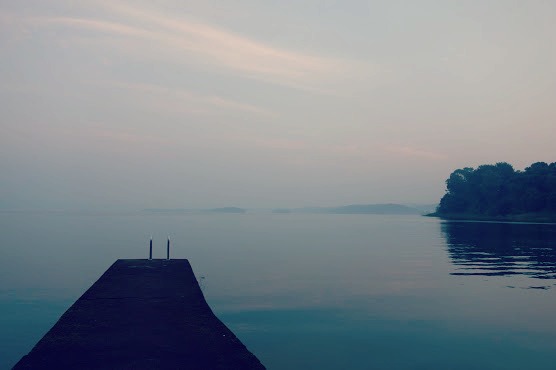
Thank you so much Betsy for writing this post! I hope you all enjoyed. If you have any questions for Betsy, either comment here or send me an email and I’ll be sure she gets your questions!
